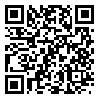BibTeX | RIS | EndNote | Medlars | ProCite | Reference Manager | RefWorks
Send citation to:
URL: http://journal.jmu.ac.ir/article-1-79-en.html
2- Shahid Sadoghi University of Medical Science ,
3- Yazd University
Introduction: Perceived stigma is one of the most important psycho- social consequences of HIV/AIDS patients. Several psycho- social factors have been noticed in determination of the perceived stigma in people with HIV symptoms. This study aims to determine the relation between illness perception and perceived stigma in patients with HIV symptoms
Methods: This study is an cross-sectional analytic study. Data were collected from 63 patients with HIV symptoms who had referred to Yazd Behavioral Diseases Clinic. These patients were chosen according to convenience sampling method. Data were collected by Illness Perception Questionnaire (IPQ) and Perceived Stigma Questionnaire (HIVPSS). Pearson correlation and regression analyses were done using SPSS V. 20. P-values ≤ 0.05 were considered significant.
Results: The perceived stigma has a significant correlation with consequent illness (r=-0.377, P<0.01) and acute or chronic timeline (r=-0.447, P<0.01). Hierarchical multiple regression analysis showed that illness perception components explain %38.1 of the variance in perceived stigma.
Conclusion: The correlation between illness perceptions and perceived stigma in patients with symptomatic HIV disease is confirmed. It can be expected that considering the different aspects of illness perceptions with symptomatic HIV disease is helpful in controlling and reducing stigma.
Key words: HIV, AIDS, Iran, perceived, stigma; illness, perception
Received: 2015/05/17 | Accepted: 2015/09/12 | Published: 2016/09/21
| Rights and permissions | |
 |
This work is licensed under a Creative Commons Attribution-NonCommercial 4.0 International License. |



